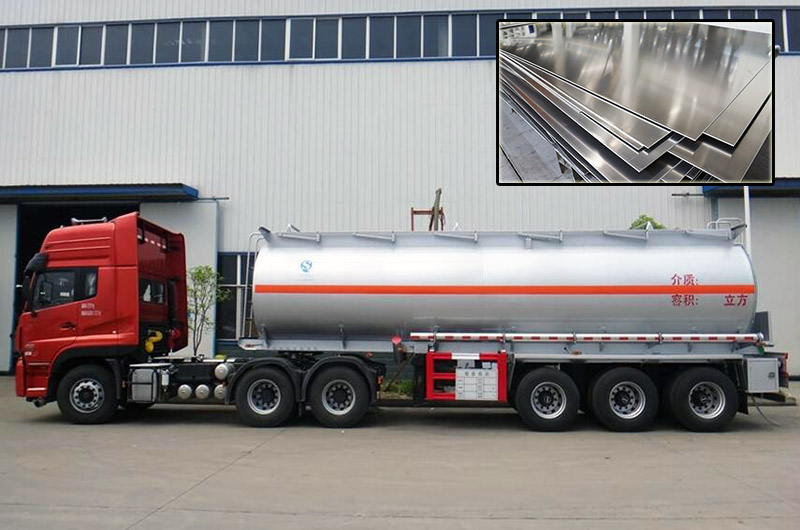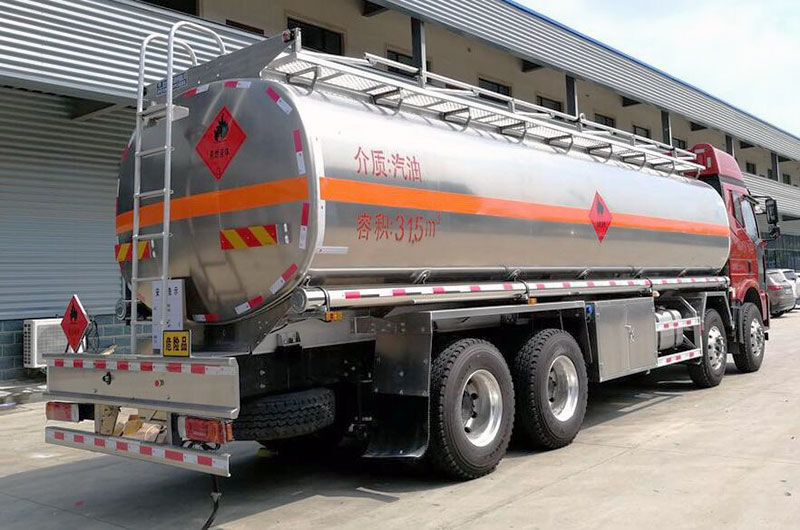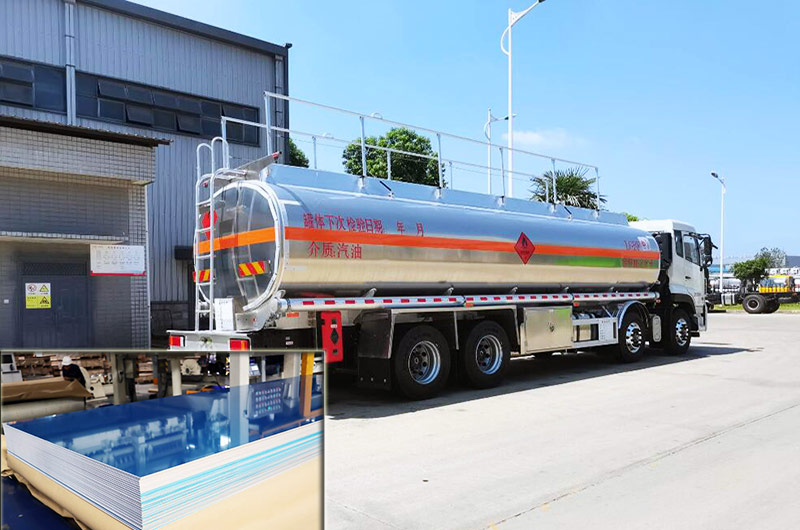- Understanding Fuel Tanker Aluminum
- Specifications of Aluminum Plate for Fuel Tanker
- 5083 5454 Aluminum Plate for Fuel Tanker
- Problems Often Encountered When Using Aluminum Plate for Fuel Tanker
- People also ask about Fuel Tanker Aluminum
"Fuel Tanker Aluminum" is specifically focused on the use of aluminum in trailers designed for transporting fuel.
"Tanker Trailer Aluminum" is a more general term referring to the use of aluminum in tanker trailers for various liquid transport applications.
"Tanker Aluminum" could be a general reference to aluminum used in tankers.
Fuel transportation is a critical component of modern society, and the materials used in fuel tanker construction play a pivotal role in ensuring the safe and efficient delivery of petroleum products. Among these materials, aluminum stands out for its unique combination of properties.

Understanding Fuel Tanker Aluminum
1. Composition of Fuel Tanker Aluminum
Overview of aluminum alloys commonly used in fuel tanker construction (e.g., 5083, 5454).
Importance of alloy selection based on mechanical properties, corrosion resistance, and weldability.
2. Properties of Fuel Tanker Aluminum
Lightweight nature and its impact on fuel efficiency.
Corrosion resistance and its significance in preventing fuel contamination.
High strength-to-weight ratio for improved structural integrity.
3. Manufacturing Processes
Extrusion and rolling techniques in aluminum sheet production.
Welding methods for joining aluminum components.
Surface treatments and coatings for enhanced durability.

Specifications of Aluminum Plate for Fuel Tanker
Aluminum plates used in the construction of fuel tanker trailers come in various thicknesses, each chosen based on the specific requirements of the application. Commonly used thicknesses include:
3 mm Aluminum Plate for Fuel Tanker
Suitable for lighter-duty applications where weight reduction is a critical factor.
4 mm Aluminum Plate for Fuel Tanker
A versatile thickness suitable for a range of fuel tanker applications, providing a balance between weight and structural integrity.
5 mm Aluminum Plate for Fuel Tanker
Commonly used for medium-duty fuel tankers, offering enhanced strength compared to thinner plates.
6 mm Aluminum Plate for Fuel Tanker
Provides increased structural integrity, often used in heavy-duty fuel tanker trailers designed for demanding conditions.
8 mm Aluminum Plate for Fuel Tanker
Reserved for specialized applications requiring extra strength and durability, such as the construction of large-capacity fuel tankers.
10 mm and above
Used in heavy-duty and industrial-grade fuel tankers, where maximum strength and load-bearing capacity are paramount.
5083 5454 Aluminum Plate for Fuel Tanker
5083 Aluminum Plate for Fuel Tanker
Specifications:
Thickness Options: Typically available in a range of thicknesses, commonly used in fuel tanker construction, including 3mm, 4mm, 5mm, and 6mm.
Alloy Composition: Primarily composed of aluminum, with small amounts of magnesium and traces of manganese, chromium, and other elements.
Properties:
Excellent corrosion resistance, making it suitable for contact with various fuels and chemicals.
High strength, particularly in the welded joints, contributing to the structural integrity of the fuel tanker.
Good formability, allowing for the fabrication of complex shapes and structures.
Applications: Widely utilized in the construction of fuel tanker trailers, especially where resistance to corrosion and durability are critical.

5454 Aluminum Plate for Fuel Tanker
Specifications:
Thickness Options: Available in a range of thicknesses, similar to 5083, with common options such as 3mm, 4mm, 5mm, and 6mm.
Alloy Composition: Primarily composed of aluminum, with additions of magnesium and traces of manganese.
Properties:
Excellent corrosion resistance, especially in marine environments and contact with various fuels.
High strength and toughness, contributing to the structural reliability of the fuel tanker.
Good weldability, ensuring strong and durable joints in the construction.
Applications: Widely employed in fuel tanker construction, particularly in scenarios where corrosion resistance and robustness are paramount.
Comparative Analysis
1. Corrosion Resistance
Both 5083 and 5454 offer excellent corrosion resistance, which is crucial for fuel tanker applications where exposure to various chemicals and environmental conditions is common.
2. Strength and Toughness
Both alloys provide high strength and toughness, ensuring the structural integrity of the fuel tanker under load and during transportation.
3. Formability and Weldability
Both alloys exhibit good formability and weldability, allowing for the fabrication of complex tanker structures and strong joints.
4. Thickness Options
Both alloys come in similar thickness options, providing flexibility in design and meeting specific application requirements.
5. Applications
Both 5083 and 5454 are extensively used in the construction of fuel tanker trailers, where their combination of properties addresses the challenges associated with fuel transportation.
In summary, both 5083 and 5454 aluminum plates are well-suited for fuel tanker applications, offering excellent corrosion resistance, strength, and weldability. The choice between the two may depend on specific project requirements, regional availability, and cost considerations.
Problems Often Encountered When Using Aluminum Plate for Fuel Tanker
1. Corrosion
Despite aluminum's natural corrosion resistance, exposure to certain chemicals present in fuels can lead to corrosion over time. Regular inspections and appropriate coatings can mitigate this issue.
2. Welding Challenges
Welding aluminum plates requires specific expertise due to its high thermal conductivity. Inadequate welding techniques can result in weak joints or deformation of the plates.
3. Fatigue and Cracking
Frequent loading and unloading, coupled with the dynamic stresses during transportation, can lead to fatigue and cracking. Proper design considerations and material selection help minimize these issues.
4. Impact Resistance
Aluminum, while strong, may not be as impact-resistant as some other materials. Dents and deformations can occur from accidental impacts during handling or transportation.
5. Baffle and Seam Integrity
Ensuring the integrity of baffles and seams is crucial to prevent liquid surge and maintain the stability of the fuel load. Poor design or construction can lead to compromised integrity.
6. Thermal Expansion
Aluminum has a relatively high coefficient of thermal expansion. Changes in temperature can lead to expansion or contraction, affecting the overall structure. Proper allowances must be made during construction.
7. Regulatory Compliance
Adherence to various safety and regulatory standards is essential. Failure to comply with regulations regarding materials, design, and construction can result in legal issues and safety concerns.
8. Cost Considerations
While aluminum has numerous advantages, it can be more expensive than some alternative materials. Balancing the benefits against the cost is a crucial consideration for manufacturers and operators.
9. Recycling Challenges
While aluminum is highly recyclable, challenges may arise in the recycling process due to the presence of coatings or contaminants. Proper recycling procedures need to be followed to maintain material quality.
Addressing these challenges requires a holistic approach, including proper material selection, construction techniques, regular maintenance, and compliance with industry standards and regulations. Continuous research and development aim to enhance the performance of aluminum plates in fuel tanker applications and overcome these challenges.
People also ask about Fuel Tanker Aluminum
- Can a fuel tank be made of aluminum?
- What are fuel tankers made of?
- Is gasoline corrosive to aluminum?
- Can you store gasoline in an aluminum tank?
